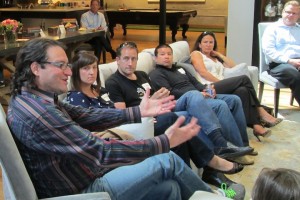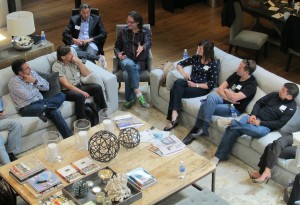By Bruce V. Bigelow

It’s one thing to read a leading tech investor’s new book on building entrepreneurial ecosystems, and another thing altogether to host him in a sweet living room art gallery with a couple dozen of San Diego’s tech leaders, investors, and entrepreneurs.
With help from the Cooley law firm and the commercial real estate firm Hughes Marino, Xconomy arranged for Brad Feld to meet with some of San Diego’s local tech leaders during a stopover yesterday.
Feld is a managing director at the Boulder, CO-based Foundry Group, a venture firm that invests in early stage software and Web startups throughout the United States. He began making seed investments after moving to Boulder with his wife Amy in 1995. He’s made hundreds of investments since then, and his list of noteworthy deals includes Zynga, MakerBot, Fitbit, and Cheezburger.

Perhaps more importantly, Feld has been instrumental in creating an ecosystem that has enabled startups to flourish in Boulder, and he counts about 500 companies there today. He also is the co-founder of TechStars, the mentor-driven tech accelerator program, and the author of several books and blogs, including Feld Thoughts. His latest book is Startup Communities: Building an Entrepreneurial Ecosystem in Your City. In the book, Feld lists the chief principles of what he calls the “Boulder Thesis” for fostering a startup culture.
—The startup community must be led by entrepreneurs.
—Leaders must make a long-term commitment.
—The startup community must be inclusive of anyone who wants to participate.
—The startup community must have continual activities that engage all entrepreneurs, from newbies to experienced veterans.
In person, Feld offered some other personal observations from his years of experience, including:
—Startup communities are messy. A fast-growing startup is like a wild animal, and you want that. But hierarchical organizations hate that; they want to put them in zoos. Most of the nonprofit organizations that support startups and entrepreneurship are hierarchical by nature. They have boards of directors. They have leaders who have jobs. Entrepreneurs have networks. So the intersection of a network and a hierarchy is not an easy fit.
—The most powerful thing that entrepreneurs can do to integrate with such organizations is try as hard as possible to be inclusive with the people within those organizations who want to participate. Either they go native and join in the entrepreneurs’ network, or they decide they just can’t join and you end up with a parallel universe. You don’t have to get everyone to participate. You just have to make it easy for anyone who wants to participate.

—Developing a startup ecosystem requires the experienced entrepreneurs, investors, and leaders to help others without the expectation of an immediate quid pro quo. “Give before you get” is not altruism; it is goodwill that hasn’t been turned into a transaction. It’s a long-range game, and it’s part of the reason why you have to make a long-term commitment to the community. Feld says he has a 20-year horizon.
—Getting institutional funding from venture investors is never easy. Just about every startup community has trouble getting VC funding. Startup communities should focus on getting the seed funding, on cultivating and networking with angel investors. After that, if things are going well and the company is growing, the other kind of funding will be easier to get.
—Startup communities need both mentors and advisors, but there’s a difference. Advisors say “I’ll help you for a one-percent stake in your company or a $3,000 a month retainer.” Mentors say, “How can I help?” Many of the institutions that try to help startups struggle with this mentorship idea.
—Startups are an endless experiment. If you’re an entrepreneur and you try something and it’s not working, you adapt. You try something different or you shut it down. That’s what innovation is all about. Don’t pick a course and stick with it no matter what. That’s what big companies do. See what events and ideas work and develop their own momentum.
—-Failure has to be OK. If you work hard and try your best, your investors should understand. It doesn’t cost $10 million to fail anymore; it costs $1 million and the failures are not complete.
Attending the lunch discussion, which was hosted by Hughes Marino and sponsored by the Cooley law firm, were: Navid Alipour of La Costa Ventures, Blaise Barrelet of Analytics Ventures, Jon Belmonte of Cedar Ridge Ventures, Embarke CEO Al Bsharah, Cliff Buro of Team Ventures, CyberFlow Analytics CEO Hossein Eslambolchi, Lean Entrepreneur co-author Brant Cooper, StockTwits CTO Chris Corriveau, TapHunter CEO Melani Hunter, StockTwits CEO Howard Lindzon, Brian Mesic of Anthem Venture Partners, Yealthy CEO Austin Neudecker, Eric Otterson of the Cooley law firm, Earthrisk Technologies CEO John Plavan, Anametrix CEO Pelin Thorogood, Steve Tomlin of Avalon Ventures, entrepreneur Arie Trouw, Bill Unrue of GTD Acquisitions, Superpowered CEO Patrick Vlaskovits, Kareer.me CEO Matt Wickstrand, John Jarvis of Hughes Marino, Craig Knox of Hughes Marino, Xconomy intern Juliet Preston, and Cooley partner Steve Przesmicki.
To view the original post from Xconomy, click here.






